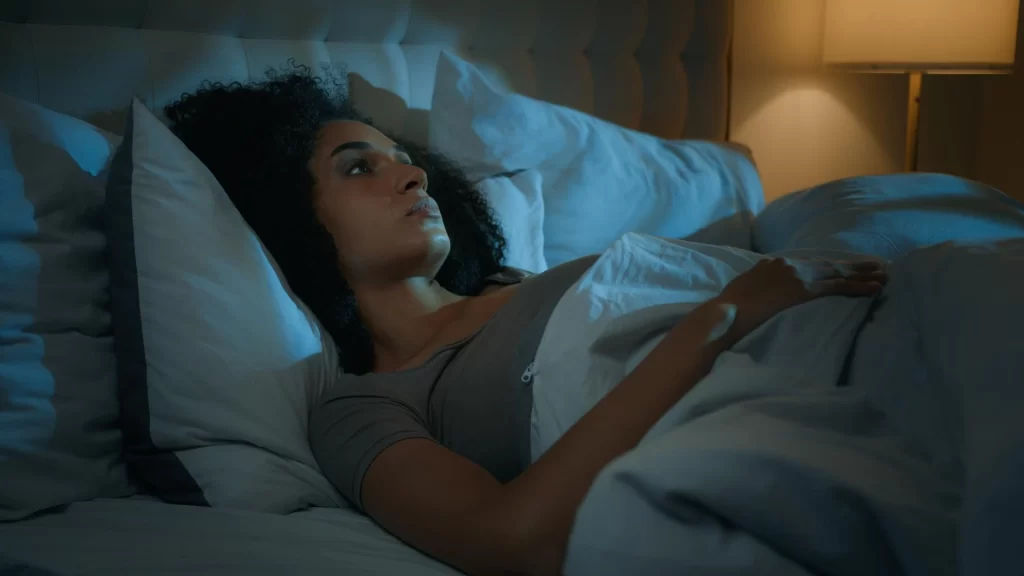Why You’re Feeling Tired All Day and Restless All Night

Hey there,
Eric Thompson here.
I want to share a story with you today, and trust me, it’s one you’ll want to hear.
Especially if you’re tossing and turning at night…
Or feeling like you just can’t get your mind to focus during the day.
A few months back, I found myself in a bit of a pickle.
I’d wake up feeling like I hadn’t slept a wink.
And during the day? Forget about it.
I couldn’t focus for more than five minutes without feeling that annoying brain fog creep in.
I was tired, grumpy, and honestly, starting to feel like my body was betraying me.
Ever been there?
Where no matter what you try…
Another cup of coffee, some power yoga, maybe even a little midday meditation…
Nothing seems to shake that feeling of being stuck in the mud?
Well, one night, after another failed attempt to fall asleep…
(despite counting more sheep than I ever thought existed!)…
I had a realization.

I sat up in bed, stared at the clock flashing 3:00 AM…
And it hit me like a ton of bricks…
This isn’t just about sleep.
Something bigger is happening.
That’s when I remembered the pineal gland.
Now, you might already know that the pineal gland, also called the “third eye…”
Is famous for producing melatonin at night.
But what I had completely overlooked, and what most of us forget…
Is that this tiny powerhouse is also responsible for producing serotonin during the day!
That’s right.
The same gland that helps you fall asleep at night also helps you wake up happy and energized during the day.
Why Does This Matter?
Let me ask you…
Have you ever wondered why some days you just feel “off?”
Like, you’re not just tired.
You’re mentally checked out, emotionally drained, and spiritually flat?
Or maybe, like me, you’ve found yourself staring at the ceiling at night…
Unable to shut your brain off, wondering why sleep seems like an impossible task.
Here’s the thing:
It’s not just about the number of hours you sleep or the amount of sunlight you get.
It’s about the delicate balance your body is constantly working to maintain…
All day and all night, with your pineal gland playing a starring role.
Think about it.
This tiny gland is your personal “sun and moon” manager.
It produces serotonin during the day to keep you alert, focused, and happy.
And then, when the sun goes down, it switches gears to produce melatonin…
Which gently guides you into that deep, restful sleep you so desperately need.
Sounds like a magical little multitasker, doesn’t it?
How Does the Pineal Gland Pull This Off?

Picture your pineal gland like a 24-hour diner in your brain:
Always open, always serving up exactly what you need…
Whether it’s the serotonin “sunshine special” during the day or the melatonin “moonlight delight” at night.
It’s constantly adjusting, responding to light and darkness…
And making sure you’re getting just the right mix of alertness and calm.
But when this gland gets out of whack…
It throws everything off balance.
And trust me, it doesn’t take much to tip the scales.
Just think about all the things we’re exposed to daily…
Blue light from screens, stress from work, the so-called “harmless” fluoride in our water…
All of these can interfere with your pineal gland’s ability to function properly.
Why Should You Care?
Well, let me tell you, this gland is the difference between waking up feeling refreshed and energized…
Or dragging yourself out of bed like a zombie from a B-movie.
It’s the difference between breezing through your to-do list with a smile…
Or snapping at your kids, your partner, or your coworkers because you just can’t deal.
You see, serotonin is called the “feel-good” hormone for a reason.
When your pineal gland is working right, it helps produce serotonin in the morning when you first see daylight.
This not only elevates your mood but also helps regulate appetite and digestion…
Gives you a sense of well-being, and keeps your mental focus sharp.
And melatonin, as you might already know…
Is the hormone that signals to your body that it’s time to wind down, relax, and get that deep, restorative sleep.
So when your pineal gland isn’t calcified (more on that in a second!)…
It’s able to seamlessly transition from producing serotonin to melatonin as day turns to night.
But here’s where things go south…
If your pineal gland is compromised, you can kiss those benefits goodbye.
No serotonin means you’re cranky and unfocused.
No melatonin means sleepless nights and endless tossing and turning.
What’s Causing Your Pineal Gland to Malfunction?

Let me ask you another question…
Have you ever thought about how much fluoride you’re exposed to every day?
Or how much blue light you’re soaking up from your phone, tablet, or TV screen?
These are just two of the many factors that can lead to calcification of your pineal gland.
And when that happens, it’s like someone’s poured concrete over your third eye.
No serotonin, no melatonin, no balance.
The Result?
You feel wired but tired, always “on” but never really present…Always searching for that elusive rest and calm that seems to slip further away.
What Can You Do About It?
First off, don’t panic! I’ve been there, and I’ve found some pretty simple steps that can help.
And no, I’m not going to tell you to stop using your phone or to stop drinking water…
Though there are some changes you’ll want to consider.

For starters, try getting more sunlight first thing in the morning.
This will help reset your circadian rhythm and stimulate serotonin production.
You can also consider reducing your exposure to blue light at night.
Think dimming the lights, using blue-light-blocking glasses, or investing in screen filters.
And here’s where it gets really important:
You need to actively work to decalcify your pineal gland.
I have written many newsletters about this that you may find helpful.
Wrapping Up
So, what do you think?
Do you feel like your pineal gland might be screaming for help?
Are you curious about how you can start supporting this tiny gland that does SO much for you?
Hit reply and let me know! I read every response, and I’d love to hear your story.
Tell me what you’re struggling with, what you’ve tried, and what’s working…
(or not working)…
For you.
Until next time,
Eric

